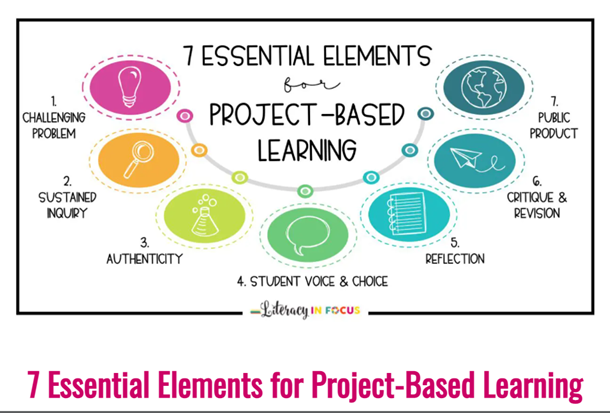e-Learning Ecologies MOOC’s Updates
Discussion Update #2 – Project based learning
Project based learning is allowing students to learn by doing and applying ideas. (Blumenfeld et al, 2000: Krajcik et al, 1994). Learners gain a deeper understanding of the material when they are actively constructing and finding their ideas. Students are engaged in real meaningful problems and allows students to investigate question, propose hypotheses and explanations, discuss ideas, challenge other ideas, and try out new ideas. Using project-based learning provides opportunities for students to build key qualities learnt in a traditional classroom and apply it into the real world.
“Experienced teachers know that when students are deeply engaged by a topic or a task, a lot of the classroom management issues fade away. Students who disrupt classes behave differently when they’re doing active work on a project that engages them.” (Lambros,2002)
A study was done by (Conley, 2005) I which he explored key skills and knowledge required to enter completing college courses. He mentioned the following:
- Critical thinking skills
- Analytical thinking skills
- Problem solving skills
- Open to and utilize critical feedback
- Open to possible failures at times
- Clear and convincing written an oral expression
- Can weigh sources for importance and credibility
- Can draw inferences and reach conclusions independently
- Time management skills
In an IT based lesson student can be introduced to opening running a small, sweet shop in their local area. They will need to find a suitable software to save all the data about the sales of the shop, designing posters for advertisements for this grand opening. The concept of the scenario can be driven a directed in a manner where students will be in teams of 5 and research all the factors they will need to consider opening and run the shop. The student will then present their ideas to the rest of a class as a team. Many different skills are learnt independently by the student such as filtering valid information, communication, incorporating software for different uses, business ideas and concepts and marketing and many more skills.
The whole concept of project base learning gives students the exposure to linking concepts and theories learnt to a real-life scenario. Students will take concepts they are learnt and analyse them when given a project-based task. Using the example above students are forced to research about a business and how detailed and precise the students give answers gives teachers an idea of how their understanding.
In project based learning the teacher is an essential part of the learning progress where they are guiding students to independently discover meaning with the subject area. (Dewey, 1938). Furthermore, it was also stated that “Projects with no attention to teacher judgement, guidance and interaction were likely to fail or, at minimum, fail to challenge students (Dewey & Small, 1987).
The role of the adult teaching then shifts into the directing and facilitating the learning the students are receiving through the research. The teacher can then probe the other students to ask the presenting groups questions to test their understanding of what was researched. The essential elements to a successful project assigned to students is to ensure that the projects are clearly defined and presented to students. The teacher then plays a role of a mentor ensuring that the students are guided and scaffolded into the right direction. Peers in the class then can give feedback to group presentations and then review their own project work and self-evaluate and comment on what they could have done differently. Teachers then can read their feedback and comment on any areas that they need to work on in the future.
References
1. Blumenfeld, P.C, Krajcik, J.S Kam,R. Kempler, T.m & Geirt,R.(2005, April) Opportunity to learn in PBL for middle school science: Predicting urban student achievement and motivation. Paper presented at the Annual Meeting of the American Association for Research in Education, Montreal, Canada.
2. Conley, D. T. (2005). College knowledge: What it really takes for students to succeed and what we can do to get them ready. San Francisco: Jossey-Bass.
3. Dewey, J. (1938), (1997 edition) Experience and Education, New York: Touchstone.
4. Lambros, A. (2002). Problem-based learning in K-8 classrooms. Thousand Oaks, CA: Corwin Press. [Google Scholar]



Project-based learning is a vivid example of understanding the student and discovering his talents. I applied this task with my students in calculating the percentage increase or decrease in food offered in the markets and the results were impressive.